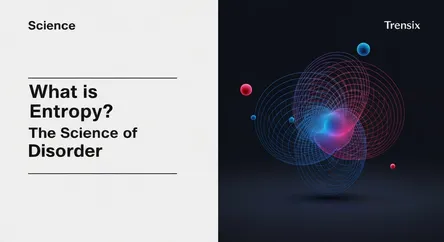Science
What is Entropy? The Science of Disorder

A concise explanation of entropy, the scientific measure of disorder, and how this fundamental law of physics impacts everything from the universe to you.
What is it?
Entropy is a fundamental scientific concept that measures the amount of disorder, randomness, or uncertainty within a system. First introduced in the field of thermodynamics, it essentially quantifies the number of possible microscopic arrangements of atoms and molecules that make up a system. A system with low entropy is highly ordered, like a neatly organized bedroom. In contrast, a system with high entropy is disordered, like a messy bedroom where clothes and papers are scattered randomly. According to the Second Law of Thermodynamics, the total entropy of an isolated system can never decrease over time; it will always tend to increase or stay the same.
Why is it trending?
Entropy is a cornerstone of physics that explains why certain processes are irreversible, giving time its direction—often called "the arrow of time." Its relevance extends far beyond classical thermodynamics into diverse fields like cosmology, biology, information theory, and even economics. Scientists use entropy to understand everything from the ultimate fate of the universe (the "heat death") to the efficiency of engines and the folding of proteins. In technology, the principles of entropy are crucial for data compression and machine learning algorithms, making it a consistently relevant and explored topic.
How does it affect people?
The effects of entropy are visible in everyday life. It's the reason a hot cup of coffee cools down, ice cubes melt, and buildings crumble over time. On a personal level, entropy is the natural tendency for our lives to become less structured and more chaotic without conscious effort. Maintaining a clean home, staying healthy, sustaining relationships, and running a successful business all require a constant input of energy to counteract the relentless pull of entropy towards disorder. Understanding this principle highlights why continuous effort is necessary to maintain order and structure in our lives.